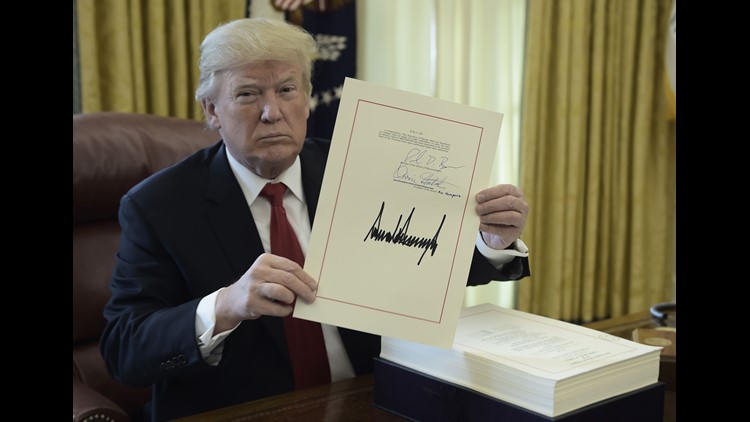Hours after Congress passed the tax bill last week, President Trump declared the Affordable Care Act "essentially" repealed.
On Tuesday morning, Trump tweeted, "Based on the fact that the very unfair and unpopular Individual Mandate has been terminated as part of our Tax Cut Bill, which essentially Repeals (over time) ObamaCare, the Democrats & Republicans will eventually come together and develop a great new HealthCare plan!"
In fact, Obamacare was barely touched.
What was repealed — effective in 2019 — was the requirement that nearly everyone have insurance or pay a penalty at tax time.
"This is important but it's not the heart of the ACA, by any means," says Sara Collins, vice president of health care coverage and access for the non-profit Commonwealth Fund.
What the tax bill doesn't change:
• The federal and state exchanges that sell insurance to those who don't get it from their employers will remain open and people who gained Medicaid coverage under the expansion of the program will be able to keep it.
• Subsidies will remain available if these people who make below 400% of the federal poverty limit (about $98,000 for a family of four).
• Most employers will still be required to offer plans that comply with the law. And a variety of other requirements for insurers, doctors and hospitals will be intact until or unless Congress or the Department of Health and Human Services (HHS) changes them by legislative or regulatory fiat.
The mandate's "effect was highly exaggerated because it wasn't an effective mandate to begin with," says health care economist Gail Wilensky, who headed the Centers for Medicare and Medicaid Services in the George H.W. Bush administration.
The penalty for not having insurance was often far less than the cost of having insurance. Besides, there were too many ways people could be exempted from the requirement, says Wilensky, a senior fellow with the global health foundation Project Hope.
More evidence of the ACA's staying power: CMS Administrator Seema Verma tweeted Thursday that nearly 9 million people signed up for insurance during open enrollment, which ended Dec. 5, on the federal exchange used by people in 39 states.
That's 96% of the enrollment through the end of the much-longer open enrollment period last year, says Lori Lodes, co-founder of the advocacy group Get Covered America.
The effect of the mandate's repeal will actually be felt mostly by the very people Trump has said he was trying to help — those paying soaring premiums for their health plans. Premiums are expected to increase overall by about 10% when the mandate is repealed, largely because it may discourage healthy people from buying insurance. These people help offset the cost of health care for the sick. Collins says the effect of the increase could vary widely by state.
On the other hand, the subsidies for those buying their own insurance who earn less than 400% of the poverty limit increase as premiums increase.
That's helped minister Wiley Lowe, who watched his monthly premiums go up from about $350 a month before than ACA to what was going to be about $1,600 a month for the single father and his two children in 2018. Then his best paying employer — a television company — went bankrupt so he lost enough income to qualify for large subsidies. Now, he will only have to pay $200 a month for insurance for he and son Mason, 20. Daughter Alayna, 17, has to be covered by the Medicaid plan known as the Children's Health Insurance Program (CHIP).
"I'm glad the mandate that was strong-arming people into purchasing insurance will soon be over, but those who choose not to purchase insurance can't blame others if tragedy strikes," says Lowe of Flagler Beach, Fla. "I will always try to have insurance, but it has to be affordable."
Gambling with insurance
Healthy people looking for lower premiums who are willing to gamble that they'll stay healthy may have an alternative with the administration's plans to allow short-term insurance plans for longer periods and to give people and small businesses the chance to group together to buy insurance. This was part of an executive order Trump signedin October and could be part of rule making at HHS next year.
The downside: These "association" plans might not have as sweeping coverage as required under the ACA, as states could tweak what they cover. Short-term plans, which are far less regulated and can only last three months now, would be allowed for up to a year. They could also refuse to cover people with pre-existing conditions and be regularly renewed.
For some, that may be preferable, as Trump believes. But his contention that "Obamacare is being repealed because they get their money from the individual mandate,” doesn't square with tax facts.
In reality, nearly all of the taxes and other provisions to pay for the law remain. That includes two taxes Obamacare imposed on people earning more than $200,000 a year: A 3.8% surtax on the investment income, and a 0.9% increase in Medicare taxes, which combined would raise $230 billion over the coming decade. Trump had included the investment tax on a one-page set of guidelines for the tax overhaul released in April with much fanfare, but it never made it into the final bill.
Indeed, of 14 “Obamacare tax increases” that Americans for Tax Reform said in a July news release would be repealed by a Senate health insurance overhaul that failed, nearly all remain.
A change to one of them made it in the bill, but it's only temporary.
Obamacare made it harder to deduct medical expenses, allowing a deduction only for costs that exceeded 10% of the taxpayer's income, up from 7.5%. The bill on Trump's desk would take that down to 7.5% again, but only for 2017 and 2018. The following year, it would go back up to 10%.
In fact, the tax bill may have the effect of shoring up the ACA exchanges. To secure the vote of Maine Republican Sen. Susan Collins on the tax legislation, Senate leaders agreed to post for votes a pair of bills intended to stabilize the health insurance market for people who are not covered by large employers.
One bill, sponsored by Sens. Lamar Alexander, R-Tenn., and Patty Murray, D-Wash., would resume “cost-sharing reduction payments” that Trump ended. These payments reduced consumers' out of pocket insurance costs.
The other, sponsored by Collins and Sen. Bill Nelson, D-Fla., would create a reinsurance mechanism to help companies get backup coverage when policyholders have catastrophic medical costs.
Trump has called the cost-sharing payments a bailout to insurers, however, and hardline conservatives in the House have said both bills would face hurdles passing that chamber.
A bipartisan group of about 30 House members introduced the Bipartisan Market Stabilization and Innovation Act to stabilize the individual marketplace and bring down health care costs for millions.



